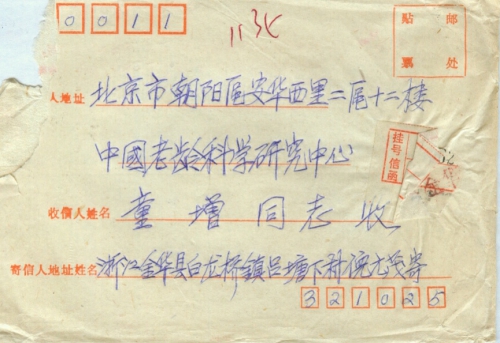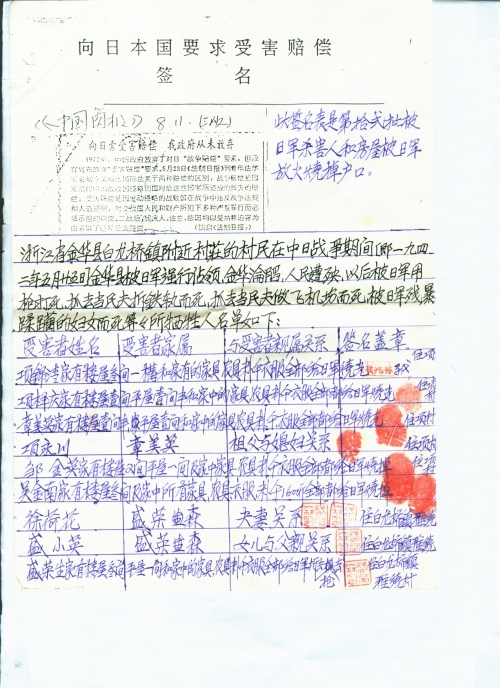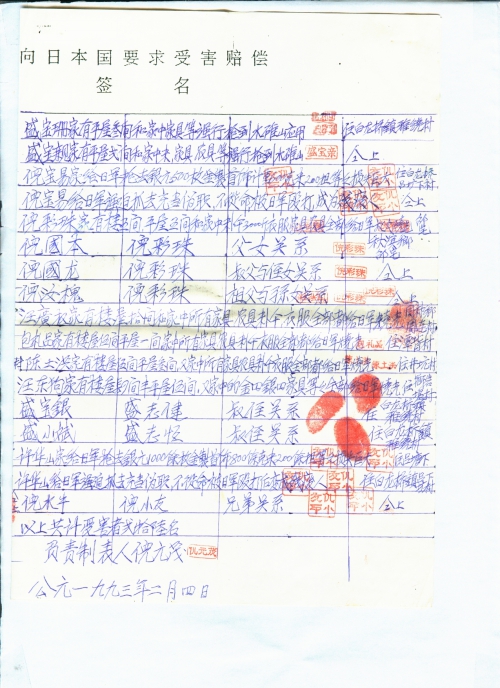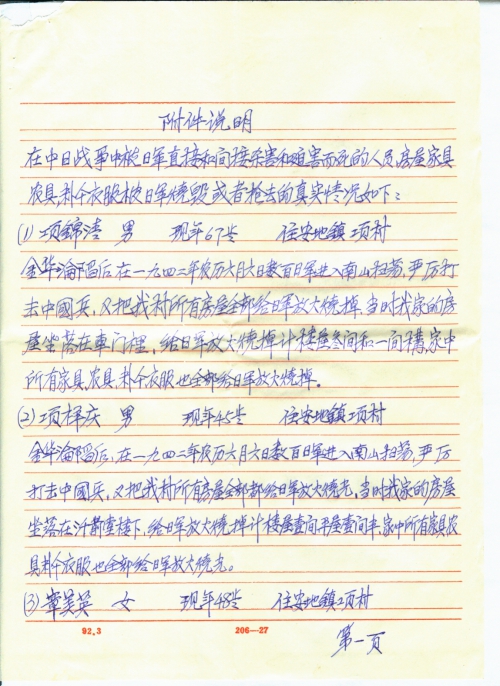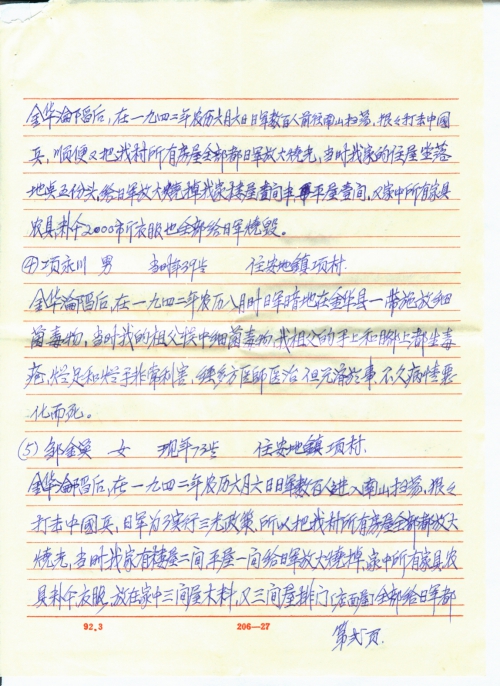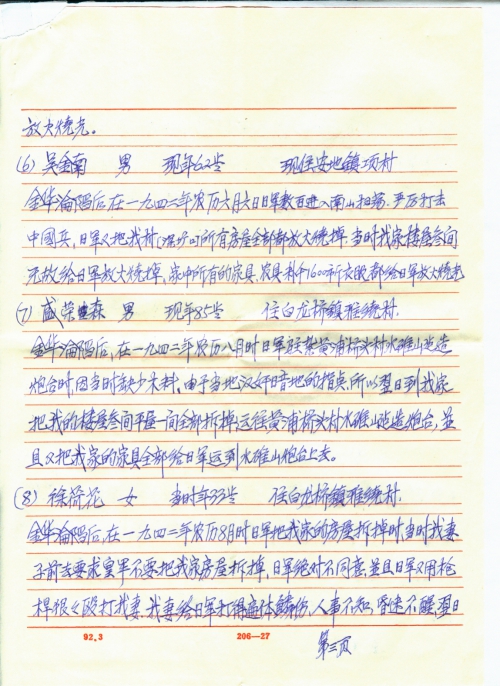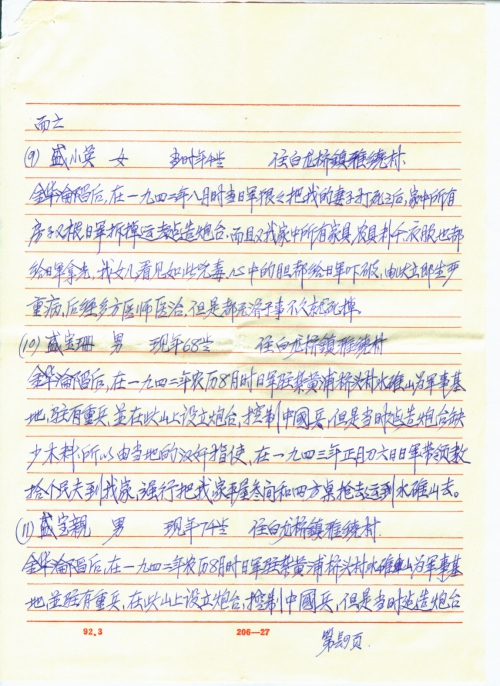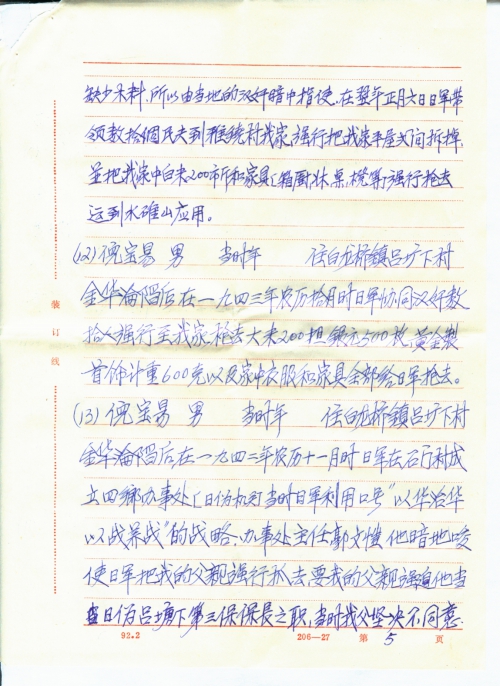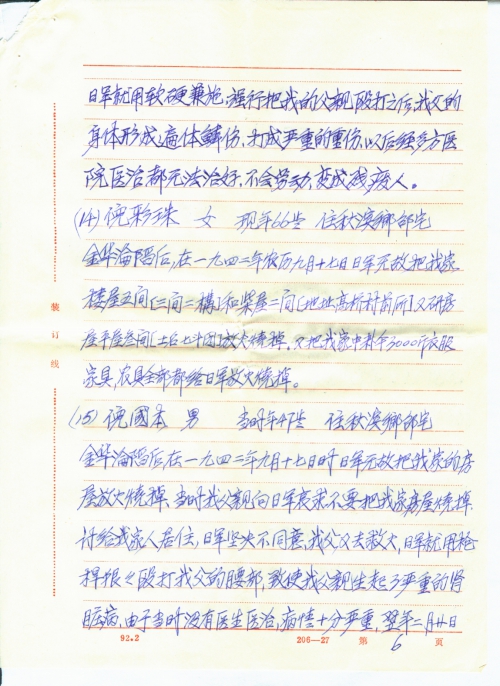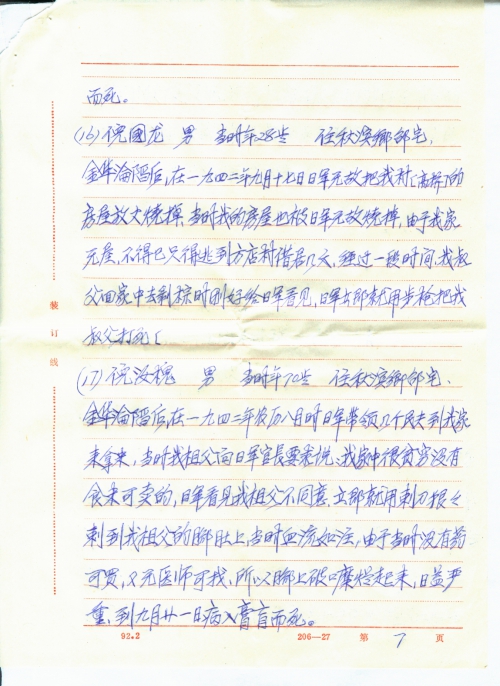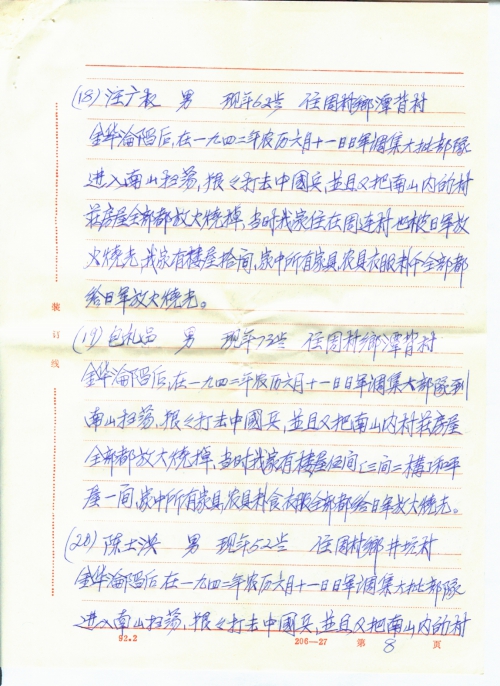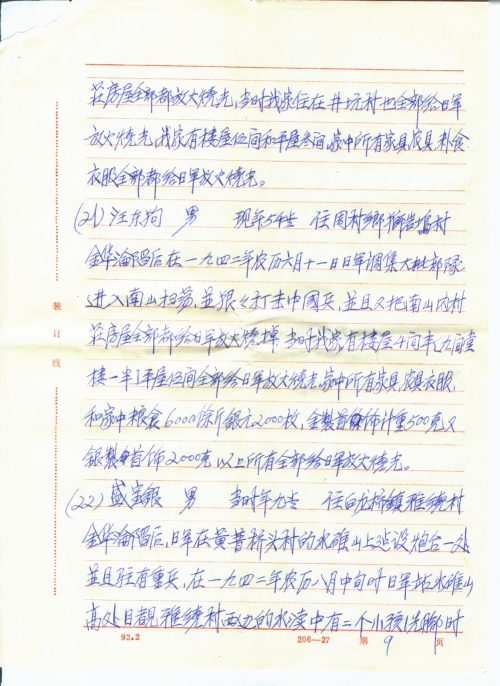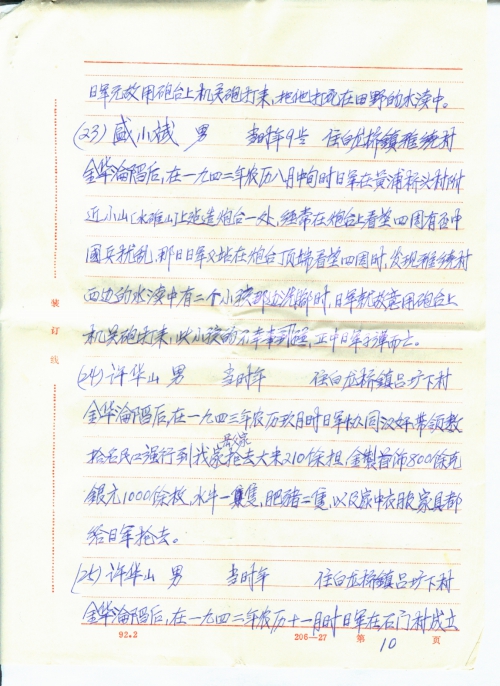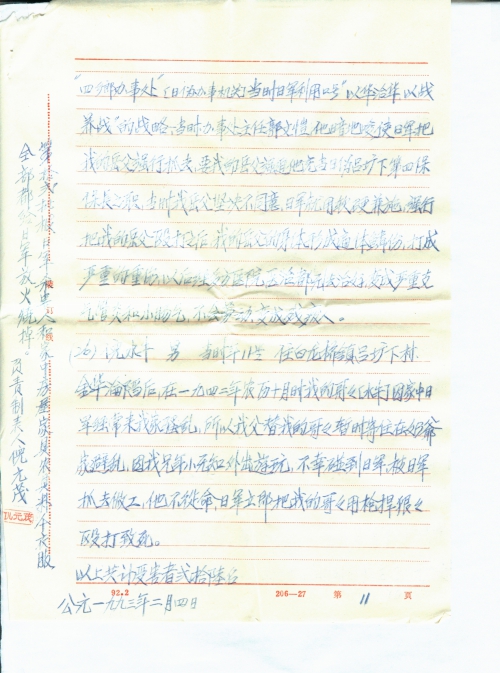Date of letter:1993-02-04
Address of author:Jinhua County, Jinhua City, Zhejiang Province
Date of event:1942-1943
Location of event:Jinhua City, Zhejiang Province
Name of author:Ni Yuanmao
Name(s) of victim(s):Xiang Xiangqing, Xiang Yongchuan, Sheng Xiaoying’s wife etc.
Type of atrocity:Others, Murders, Bio-Chemical Warfare(BC, OT, MU)
Other details:Ni Yuanmao sent the collected materials on the victims of the Jinhua City. Some of the victims are: Xiang Xiangqing’s houses were burned; in 1942, the Japanese soldiers released bacteria and toxicants in Jinhua County, and Xiang Yongchuan’s grandfather was infected with germ and finally died, with his hands and feet rotted; Sheng Xiaoying’s wife was killed by the Japanese soldiers.
Signature for Demanding Damage Compensation from Japan
China Business Herald August 11 (Page3)
“Our government has never renounced damage compensation from Japan”
In 1972, the Chinese government renounced the “War Compensation” claim against Japan, but did not renounce the “Damage Compensation” claim. On May 23, the “Legal Daily” published an article by young jurist Tong Zeng to explain the difference between the two kinds of compensations prescribed by international laws: “War compensation refers to the compensation for losses sustained by the invaded countries during the invasion launched by the defeated nation; damage compensation refers to compensation that must be undertaken by the invading nation being defeated to compensate for multiple serious crimes committed against the people and properties of the invaded nation, due to violation of laws of war and humanitarian principles during the war. After the WWII, Jews, Poland, and France all claimed huge amount of damage compensation on the ground of suffering Nazi persecution.” (Excerpted from the “Legal Daily”)
This signature form consists of the 12th batch of households who had members killed and houses burned by the Japanese Army.
During the Japanese invasion (i.e. May 25, 1942), when Jinhua County was taken over by the Japanese Army, villagers near Bailongqiao Town, Jinhua County, Zhejiang Province, , , suffered miserably. The Japanese Army shot and killed many people, captured many to work until death as laborers to dismantle railroad or to build airport, or raped and killed many women.. The specific victims and losses are listed below
Prepared by: Ni Yuanmao (name seal)
February 4, 1993
Appendix: Victims’ Testimonials
Following is a list of specific details about civilians directly or indirectly killed or persecuted by the Japanese Army, as well as houses, furniture, farming tools, grains, and clothing being burned or looted by the Japanese Army during the Sino-Japanese War:
(1) Xiang Jinqing, male, now 67, residing in Xiang Village, Andi Town
After Jinhua fell into the hands of Japan, on June 6, 1942 on the lunar calendar, several hundred Japanese soldiers entered the South Mountain for a resistance cleanup campaign. In addition to crushing the Chinese Army, all houses in our village were burned down by the Japanese Army. Back then my home was situated in Chemenli. The Japanese Army burned three houses and one bungalow. All the furniture, farming tools, grain, and clothing in the home were set on fire and burned by the Japanese Army.
(2) Xiang Xiangqing, male, now 45, residing at Xiang Village, Andi Town
After Jinhua fell into the hands of Japan, on June 6, 1942 on the lunar calendar, several hundred Japanese soldiers entered the South Mountain for a resistance cleanup campaign. In addition to crushing the Chinese Army, all houses in our village were burned down by the Japanese Army. Back then my home was situated downstairs of Qianqiantang. The Japanese Army burned one house, one and half bungalow. All the furniture, farming tools, grain, and clothing in the home were set on fire and burned by the Japanese Army.
(3) Zhang Meiying, female, now 48, residing at Xiang Village, Andi Town
After Jinhua fell into the hands of Japan, on June 6, 1942 on the lunar calendar, several hundred Japanese soldiers came to the South Mountain to clean up the resistance and crush the Chinese Army. Along the way the Japanese Army also burned all the houses in our village. Back then my home was situated in Wufentou, and was burned by the Japanese Army. One and a half house, one bungalow, all furniture, farming tools, 2000 catties of grain, and clothing were all burned by the Japanese Army.
(4) Xiang Yongchuan, male, then 39, residing at Xiang Village, Andi Town
After Jinhua fell into the hands of Japan, in August 1942 on the lunar calendar, the Japanese Army secretly released bacteria weapons in Jinhua County area. My grandfather was infected. His hands and feet became festered beyond medical treatment. Soon the condition deteriorated and he died.
(5) Zou Jinying, female, now 73, residing at Xiang Village, Andi Town
After Jinhua fell into the hands of Japan , on June 6, 1942 on the lunar calendar, several hundred Japanese soldiers entered the South Mountain for cleaning-up campaign, attacked the Chinese Army. In order to carry out their“Kill All, Burn All, and Loot All” policy, the Japanese Army burned all houses in our village. Back then two houses, and one bungalow in my home were burned, including all the furniture, farming tools, grain, and clothing in the home, three rooms of timber in the home, and plank doors of three rooms (street front house).
(6) Wu Jinnan, male, now 62, residing at Xiang Village, Andi Town
After Jinhua fell into the hands of Japan, on June 6, 1942 on the lunar calendar, several hundred Japanese soldiers entered the South Mountain for cleaning-up campaign, attacked the Chinese Army. The Japanese Army also burned all houses in our village (Shentangkou). Back then three houses in my home were burned up, including all the furniture, farming tools, plus 1600 catties of grain, and clothing.
(7) Sheng Rongsen, male, now 85, Residing at Yarao Village, Bailongqiao Town
After taking over Jinhua in August 1942 on the lunar calendar, the Japanese Army stationed at Huangpuqiaotou Village in Shuidui Mountain tried to build gun turret. Because they lacked timber, under the secret guidance from local traitors, they came to my home to dismantle three houses and one bungalow in my home, and shipped the material to Huagnpuqiaotou Village in Shuidui Mountain to build gun turret The Japanese Army also shipped all my home’s furniture to Shuidui Mountain gun turret.
(8) Xu Hehua, female, back then 33, Residing at Yarao Village, Bailongqiao Town
After taking over Jinhua in August 1942 on the lunar calendar, one day the Japanese Army was dismantling our houses. When my wife pleaded to spare our house, the Japanese Army refused and viciously beat my wife with gun stock, leaving severe injuries all over the body. She fell unconscious and died the next day.
(9) Sheng Xiaoying, female, back then 4, Residing at Yarao Village, Bailongqiao Town.
After taking over Jinhua, in August 1942 the Japanese Army beat my wife to death. All my houses were dismantled by the Japanese Army to become materials for building the gun turret. All the furniture, farming tools, grain, and clothing in the home were looted by the Japanese Army. Deeply traumatized by such ferocity of the Japanese Army, my daughter became seriously ill. Despite treatment by several doctors, she died shortly afterward.
(10) Sheng Baoshan, male, now 68, Residing at Yarao Village, Bailongqiao Town
After taking over Jinhua in August 1942 on the lunar calendar, the Japanese Army established Huangpuqiaotou Village in Shuidui Mountain as their military base, guarded by massive troops. On the mountain there was a gun turret, for the purpose of controlling the Chinese Army. But back then they lacked timber to fortify the gun turret. Guided by local traitors, on January 6, 1943 the Japanese Army led several dozen laborers to our home, dismantled and looted, and shipped the timber torn from three bungalows, along with square tables robbed from my home, to Shuidui Mountain.
(11) Sheng Baoqin, male, now 74, Residing at Yarao Village, Bailongqiao Town.
After taking over Jinhua in August 1942 on the lunar calendar, the Japanese Army established Huangpuqiaotou Village in Shuidui Mountain as their military base, which was heavily guarded. They erected gun turret on the mountain to control the Chinese army. But back then they lacked timber to fortify the gun turret, so they secretly sought guidance from local traitors. On January 6 in the next year, the Japanese Army led several dozen laborers to my home in Yarao Village, dismantled two bungalows in my home by force, and took our 200 catties of white rice and furniture (boxes, beds, tables, stools etc) by force to ship to Shuidui Mountain for use.
(12) Ni Baoyi, male, age uncertain, Residing at Lvtangxia Village, Bailongqiao Town
After taking over Jinhua, in October 1943 on the lunar calendar, the Japanese Army accompanied with several dozen traitors to come to my home and looted 200 shoulder poles of rice, 500 silver dollars, 600 grams of gold jewelry, plus all the clothing and furniture.
(13) Ni Baoyi, male, age uncertain, Residing at Lvtangxia Village, Bailongqiao Town
After taking over Jinhua, in November 1942 on the lunar calendar, the Japanese Army set up Sixiang Office (Japanese puppet organization) at Shimen Village. Trumpeting the slogan “Rule China with Chinese and Sustain War with War” as strategy, the then puppet Director of the Office, Guo Wenkai, persuaded the Japanese Army to detain my father, hoping to coerce my father to become the Village head of the Japanese Puppet Lvtangxia Third Bao. My father firmly refused. After all carrots and sticks had failed, the Japanese Army beat my father badly, leaving bruises and wounds all over his body. Despite medical treatment in a number of hospitals, the serious injuries were irreversible. My father was unable to work again, and become disabled from then on.
(14) Ni Caizhu, female, now 66, residing at Shao Residence, Qiubin Town.
After taking over Jinhua, on September 17, 1942 on the lunar calendar, the Japanese Army without provocation burned five houses in my home (three rooms twin structure), two firewood cabins (Address Gaoqiao Village vestibule), three bungalows (aka Qidouyuan), including 3000 catties of grain, clothing, furniture and farming tools were all burned by the Japanese Army.
(15) Ni Guoben, male, back then 47, residing at Shao Residence, Qiubin Town
After taking over Jinhua, on September 17, 1942 the Japanese Army burned my home without provocation. My father pleaded for mercy so our family could have a place to live. The Japanese Army flatly rejected. My father tried to put out the fire. The Japanese soldiers smacked my father’s waist with gun stock, resulting in severe kidney injury. For lack of doctors to treat, the injury deteriorated. On February 20 in the next year my father died.
(16) Ni Guolong, male, back then 28, residing at Shao Residence, Qiubin Town
After taking over Jinhua, on September 17, 1942, the Japanese Army without provocation burned houses in our village (Gaoqiao), including my house. Since I had no where to live, I was forced to flee to Fangdian Village to live for a few days. After a period, one day my uncle went home to peel some palm barks for herb, but spotted by the Japanese Army. The Japanese soldiers immediately shot my father dead with rifle.
(17) Niruhuai, male, back then 70, residing at Shao Residence, Qiubin Town
After taking over Jinhua, in August 1942 on the lunar calendar the Japanese Army led several laborers to my home to take rice. My grandfather pleaded that my home was poor and there was no rice to sell. Seeing my grandfather resisting, the Japanese Army immediately stabbed my grandfather’s foot with bayonet. Blood rushed out. At that time there was no drug to buy, nor doctor to seek trreatment, the wound on the foot began to fester, and the condition deteriorated. On September 21 my grandfather died of the complications.
(18) Wang Guangquan, male, now 62, residing at Tanbei Village, Zhoucun Town
After taking over Jinhua, on June 11, 1942 on the lunar calendar, the Japanese Army mobilized massive troops to enter the South Mountain for cleaning-up campaign. They crushed the Chinese Army and burned all village houses in the South Mountains. Back then, I lived in Zhoulian Village and my home was also burned by the Japanese Army, including ten houses, all the furniture, farming tools, clothing and grain in the home.
(19) Bao Lipin, male, now 73, residing at Tanbei Village, Zhoucun Town
After taking over Jinhua, on June 11, 1942 on the lunar calendar, the Japanese Army mobilized massive troops to launch a cleaning up campaign in the South Mountain. In addition to smashing the Chinese Army, they also burned all village houses in the South Mountains, including the five houses (three rooms twin structure) and one bungalow of my home. All the furniture, farming tools, grain and clothing in the home were set on fire and burned by the Japanese Army.
(20) Chen Tuhong, male, now 52, residing at Jingkeng Village, Zhoucun Town
After taking over Jinhua, on June 11, 1942 on the lunar calendar, the Japanese Army mobilized massive troops and entered the South Mountain for cleaning-up campaign. In addition to smashing the Chinese Army, they also burned all village houses in the South Mountains, including my home was at Jingkeng Village. My home had five houses and three bungalows, all the furniture, farming tools, grain, and clothing in the home were set on fire and burned by the Japanese Army.
(21) Wang Donggou, male, now 54, residing at Shiyanwu Village, Zhoucun Town
After taking over Jinhua, on June 11, 1942 on the lunar calendar, the Japanese Army mobilized massive troops and entered the South Mountain for a cleaning-up campaign. In addition to crushing the Chinese Army, the Japanese Army also burned all village houses in the South Mountains, including my home consisting of 4 and a half houses (half of nine hall buildings) and five bungalows. All the furniture, farming tools, clothing and over 6000 catties of grain, 2000 silver dollars, gold jewelry weighing 500 grams, over 2000 grams of solve jewelry were set on fire and burned by the Japanese Army.
(22) Sheng Baoyin, male, back then nine, Residing at Yarao Village, Bailongqiao Town
After taking over Jinhua, the Japanese Army built gun turrets on the Shuidui Mountain in Huangpuqiaotou Village, where there stationed massive troops. In the middle of August 1942 on the lunar calendar, the Japanese Army stood on high places in the Shuidui Mountain and saw two children washing feet in the pond west of Yarao Village, the Japanese Army without provocation fired machine gun from the gun turret, and killed them in the pond in the field.
(23) Sheng Xiaobin, male, back then 9, Residing at Yarao Village, Bailongqiao Town
After taking over Jinhua, in the middle of August 1942 on the lunar calendar, the Japanese Army built a gun turret on the small hill near Huangpuqiaotou Village (Shuidui Mountain). They often surveyed the surrounding area to see if there were Chinese solders who were making harassment. One day when the Japanese Army was standing at the top of the gun turret to survey the surrounding areas, they discovered two children in the water pond west of Yarao Village. The Japanese Army deliberately fired the machine gun from the gun turret. The children were unfortunately hit by the bullets, and died on the spot.
(24) Xu Huashan, male, age uncertain, Residing at Lvtangxia Village, Bailongqiao Town
After taking over Jinhua, in September 1943 on the lunar calendar, the Japanese Army accompanied by traitors, led several dozen laborers to loot over 210 shoulder poles of rice in the home of my father-in-law. Over 800 grams of gold jewelry, more than 1000 silver dollars, one buffalo, two fat pigs and all the clothing an furniture were looted by the Japanese Army.
(25) Xu Huashan, male, back then, Residing at Lvtangxia Village, Bailongqiao Town
After Jinhua fell into the hands of the Japanese, in November 1942 on the lunar calendar, the Japanese Army set up Sixiang Office (Japanese puppet organ) at Shimen Village, and trumpeted the slogan “Rule China with Chinese and Sustain War with War” as strategy. The puppet Director of the Office, Guo Wenkai, secretly pursuaded the Japanese Army to detain my father-in-law, and coerced my father-in-law to become the village head of the Japanese Puppet Lvtangxia Fourth Bao. My father-in-law firmly refused. . After carrots and sticks all failed, the Japanese Army beat my father-in-law badly, leaving bruises and wounds all over the body. Despite medical treatment by a number of hospitals for the severe injuries, my father-in-law never recovered. He later developed serious bronchitis and hernia, unable to work, and became permanently disabled.
(26) Ni Shuiniu, male, back then 11, Residing at Lvtangxia Village, Bailongqiao Town.
After Jinhua fell into the hands of the Japanese, in October 1942 on the lunar calendar, the Japanese Army often came to my home to harass us. So my father asked my elder brother (Shuiniu) to temporarily live at grandparent’s home to avoid the war turmoil. Being young and ignorant of the dangers, my elder brother slipped out and played, and unfortunately bumped into the Japanese Army. He was captured by the Japanese Army to work as laborer. He disobeyed. The Japanese Army immediately hit my elder brother with gun stock until death.
The above totals twenty six victims.
February 4, 1993 AD
This signature form is the twelfth batch of households whose victims were killed by the Japanese Army and whose houses, furniture, farming tool, and clothing were burned by the Japanese Army.
Prepared by: Ni Yuanmao (name seal)


















